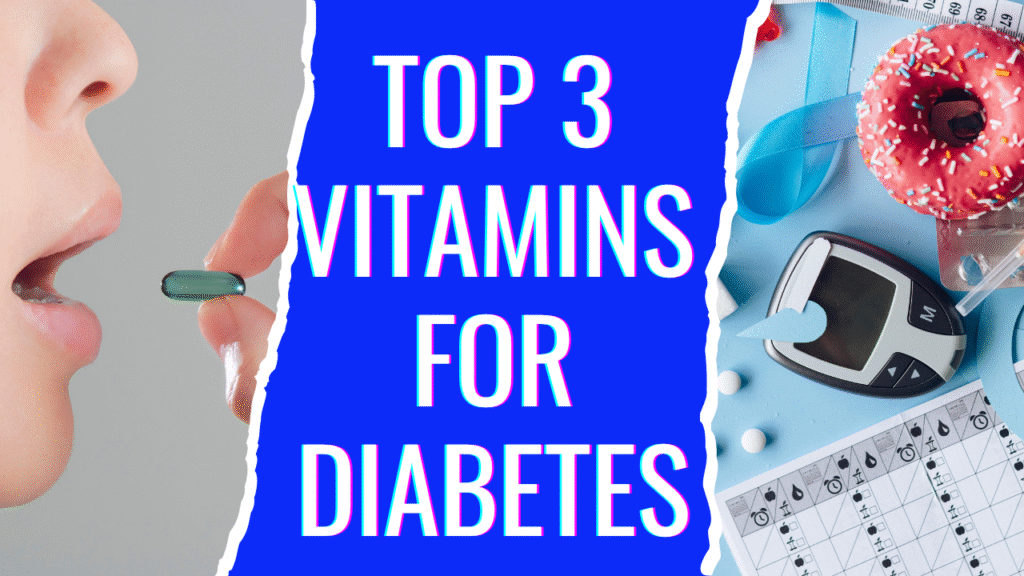
Living with diabetes can be challenging, but alongside managing blood sugar levels, cutting back on sugar, and following your medication plan, certain vitamins can significantly enhance your health. Many people with diabetes are deficient in key nutrients that support insulin sensitivity, nerve health, and heart function, often without realizing it. If you’re experiencing fatigue, nerve pain, or unstable blood sugar, you might be missing these essential vitamins. In this article, we’ll explore the top 3 vitamins for diabetes—Vitamin B6, Vitamin E, and Vitamin C—and how they can help reverse diabetes complications. Plus, we’ll share practical ways to incorporate them into your diet, optimized with SEO keywords for maximum reach.
Why Vitamins Matter for Diabetes Management
While diabetes management often focuses on medication and diet, essential nutrients play a critical role in preventing complications like neuropathy, heart disease, and immune system issues. Deficiencies in vitamins can worsen insulin resistance, increase oxidative stress, and accelerate complications. By addressing these gaps with nutrient-rich foods or supplements, you can boost energy, protect your nerves, and improve overall wellness. Let’s dive into the three powerhouse vitamins that can transform your diabetes care.
1. Vitamin B6: The Nerve Protector
Vitamin B6 (pyridoxine) is a critical nutrient for diabetes management, yet it’s often depleted in people with high blood sugar. Hyperglycemia, inflammation, and medications like metformin can drain B6 levels, leading to subtle but serious symptoms.
Signs of Vitamin B6 Deficiency:
- Chronic fatigue despite adequate rest
- Brain fog, mood swings, or irritability
- Tingling, numbness, or burning in hands and feet (neuropathy)
- Dry skin, mouth sores, or frequent infections
- Anemia symptoms like dizziness, pale skin, or shortness of breath
Benefits of Vitamin B6 for Diabetes:
- Supports nerve health, reducing the risk of diabetic neuropathy
- Enhances glucose metabolism for better blood sugar control
- Protects kidneys, eyes, and heart from diabetes-related damage
- Boosts mood and energy by supporting neurotransmitters like dopamine and serotonin
How to Get Vitamin B6:
- Foods:
- Chickpeas (1 cup = ~55% of daily needs)
- GOAT liver (100g = ~50%)
- Wild-caught salmon or turkey (~40%)
- Sunflower seeds (1 oz = ~30%)
- Recipes:
- Japanese-style miso-glazed salmon with chickpea puree (~90% of daily B6)
- Mediterranean chickpea and lamb stew (~80% of daily B6)
- Supplements: Choose P-5-P (pyridoxal-5-phosphate) (25–50 mg daily, consult your doctor).
Avoid B6 Drainers:
- Processed grains (e.g., white bread)
- Sugary foods and alcohol
- Certain medications (check with your doctor)
2. Vitamin E: The Cellular Shield
Vitamin E, a fat-soluble antioxidant, acts like a bodyguard for your cells, protecting nerves, blood vessels, and muscles from oxidative stress caused by high blood sugar. Diabetes accelerates Vitamin E depletion, especially in those with impaired fat metabolism.
Signs of Vitamin E Deficiency:
- Muscle weakness or coordination issues
- Worsening neuropathy symptoms (e.g., tingling or discomfort)
- Dry skin or slow-healing wounds
- Vision problems due to retinal damage
Benefits of Vitamin E for Diabetes:
- Improves insulin sensitivity by reducing inflammation
- Maintains flexible arteries, lowering heart disease risk
- Strengthens the immune system to fight infections
- Supports fertility and libido by improving blood flow
How to Get Vitamin E:
- Foods:
- Sunflower seeds (1 oz = ~66% of daily needs)
- Almonds (~48%)
- Hazelnuts (~28%)
- Cooked spinach or avocados (~20% and 15%)
- Recipes:
- Mediterranean grilled sea bass with almond-herb crust (~70% of daily Vitamin E)
- French avocado and sunflower seed tartare (~60% of daily Vitamin E)
- Supplements: Opt for natural d-alpha-tocopherol (200–400 IU daily, consult your doctor).
Avoid Vitamin E Depleters:
- Processed vegetable oils
- Sugary diets and excessive alcohol
- Insufficient healthy fats (needed for absorption)
3. Vitamin C: The Immune and Heart Hero
Vitamin C is a powerhouse antioxidant that’s often depleted in people with diabetes due to high blood sugar competing with its cellular uptake and frequent urination flushing it out. This deficiency can exacerbate diabetes complications.
Signs of Vitamin C Deficiency:
- Constant fatigue due to reduced energy production
- Easy bruising or slow-healing wounds
- Bleeding gums, dry skin, or frequent infections
- Joint pain from weakened cartilage
Benefits of Vitamin C for Diabetes:
- Reduces insulin resistance as a potent antioxidant
- Strengthens blood vessels, lowering heart disease and stroke risk
- Boosts immunity by enhancing white blood cell function
- Regenerates Vitamin E, amplifying its protective effects
How to Get Vitamin C:
- Foods:
- Kakadu plums (100g = ~3,000% of daily needs)
- Guava (~1,600%)
- Red bell peppers (~200%)
- Kiwis (~150%)
- Strawberries (~90%)
- Recipes:
- Tropical ceviche with kakadu plums, salmon, and bell peppers (~2,000% of daily Vitamin C)
- Japanese yuzu-infused tuna tartare with kiwi salsa (~1,000% of daily Vitamin C)
- French acerola cherry sorbet (~800% of daily Vitamin C)
- Supplements: Choose liposomal Vitamin C (500–1,000 mg daily, adjust during illness).
Avoid Vitamin C Robbers:
- Excessive sugar and high-carb diets
- Alcohol and smoking
- Overcooking vegetables (steam or eat raw to preserve Vitamin C)
Take Control of Your Diabetes Today
Vitamin B6, Vitamin E, and Vitamin C are essential allies in diabetes management, helping to protect your nerves, improve insulin sensitivity, and reduce complications. If you’re struggling with fatigue, neuropathy, or unstable blood sugar, addressing these vitamin deficiencies could be a game-changer. Incorporate nutrient-rich foods like chickpeas, almonds, and bell peppers into your diet, try delicious diabetes-friendly recipes, and consider high-quality supplements after consulting your doctor.
Small changes, like avoiding processed foods and prioritizing whole foods, can make a big difference. By nourishing your body with these powerhouse vitamins, you can boost energy, enhance heart health, and take control of your diabetes journey.
Which vitamin are you excited to add to your routine? Share your thoughts or favorite diabetes-friendly recipes in the comments, and let’s thrive together!
